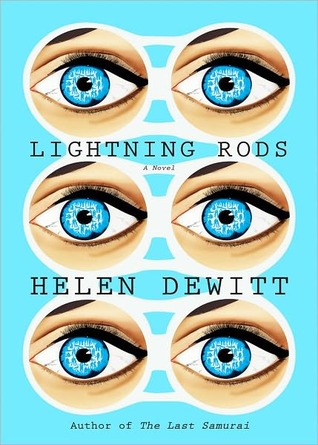
LIGHTNING RODS BY HELEN DEWITT
New Directions,
2011; Hardcover, 273 pages
Written circa 1999, Helen DeWitt's second novel seems spawned by the
stain on Monica Lewinsky's dress. Should've been published years before
October 2011 -- a shame that those who LOVED DeWitt's first novel published
in 2000, The Last Samurai, had to wait so long for NYC publishers
to get their act together (long live New Directions!).
Readers who like to laugh should read this one: the first hundred pages
seemed to have 1+ LOLs per page. Sometimes reminded me of George Saunders,
Michel Houllebecq, Amanda Filipacchi, Charlie Kaufman, Torsten Krol. Initial
hiliarity ensues thanks to the revelation and ridiculously enjoyable, rational
unraveling of the title's significance. In a recent interview, she says
this one was inspired by Mel Brooks and the "Springtime for Hiter" bit
in "The Producers" rather than the considerably higher art "The Seven Samurai"
by Kurosawa that inspired her first one.
With this one, revealing any of its audicious/bawdy turns would reduce
its pleasures. Let's just say it's about an innovative solution to a workplace
challenge and that this innovation is controversial at first but becomes
more commonplace in time. A pleasure I will reveal is that every page is
purposefully studded with cliched language, sometimes as many as three
cliches/word packages per sentence. At times I was so badly busting a gut
I felt like I could eat a horse, which is a whole different kettle of fish
that once brought to water is a pea in the satirization pod re: the rise
and sustained erection of an American business endeavor. Gotta love good
ol' American get up and go.
The book's last line is "In America anything is possible" but the story
ain't anything goes. Once it introduces and establishes the plot's implausible
engine, the rest involves its rational defense against all obstacles, particularly
politically correct ones but also those faced by any new business, like
competition from cheaper services etc. Despite the initial freakishness,
such focus is a strength but maybe also one of the book's weaknesses? A
zany, rational, totally enjoyable pageturner, like DeWitt's first novel
a little bit -- not as explicitly smart as The Last Samurai but
still fundamentally smarter and culturally critical and joyously unhinged
(and flat-out funnier, the first third of it at least) than most contemporary
American fiction I've read.
As in her first book, lots of short chapters, cliffhangers, and white
space between chapters so you finish a chapter and turn a few pages and
suddenly find you're five pages deeper into the reading day's page count.
There's something attractive about that apparently accelerative effect
. . .
Anyway, friendly folks at New Directions (or elsewhere), please publish
more of her manuscripts posthaste! She's got fans willing to buy her stuff
and spread the word.
*
Forever after at http://eyeshot.net/lightningrods.html